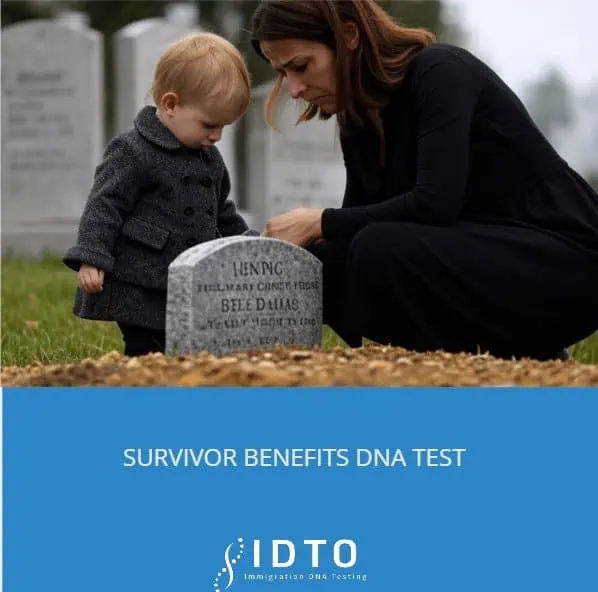
When paternity has not been established and an unmarried alleged father’s name has not been added to the child’s birth certificate before he dies, additional steps may be required to prove the parent-child relationship.
How to survivor benefits when a father is not on a birth certificate?
Survivor benefits when a deceased father’s name is not on the birth certificate.
In order for a child to be considered for survivor benefits from Social Security. The deceased father’s name has to be listed on the child’s birth certificate. When circumstances occur where the biological father passes away and his name was not added to the birth certificate. Acquiring survivor benefits will require the mother or legal guardian go through a process for the child to receive benefits.
Below are a couple of suggestions to attempt to establish the paternity of the child when the father is deceased.
- When a deceased father has recently passed away. Contact the coroner’s office to inquire if a DNA sample was collected and on file. If this is the case, the mother or legal guardian of the child can have her child’s samples collected and analyzed, and tested with the DNA samples on file.
DNA testing is often required by Social Security Administration (SSA) when an unmarried father’s name is not on the birth certificate. This is typically the most definitive form of evidence and may be the only way to establish paternity posthumously.
When DNA Testing is Required?
Below we list the scenarios were performing a paternity test may necessary to acquire survivors benefits.
- Mandatory Situations: When a man passes away who is unmarried and his name is not on his child’s birth certificate, the SSA will not award benefits to the child without proof of paternity. In these cases, DNA testing often becomes the only viable option for establishing the parent-child relationship.
- Disputed Paternity: When other family members or potential beneficiaries challenge a child’s claim to benefits, DNA evidence may be required to resolve disputes.
- Insufficient Documentation: If traditional forms of evidence (birth certificates, court orders, marriage certificates) are unavailable or inadequate, DNA testing may be the primary means of proof.
We recommend that you speak with SSA before performing a DNA test. Doing this will ensure that you are compliant with Social Security evidence submission guidance.
Deceased Fathers DNA Testing Types:
Direct Parent DNA Testing
When genetic material from the deceased father is available from the following institutions:
Coroner’s Office Samples: Contact the coroner’s office to inquire if a DNA sample was collected and on file. Common samples include blood cards or hair follicle samples collected during autopsy procedures.
Preserved Tissue Samples: Hospitals may have preserved tissue samples from surgeries or medical procedures that can be used for testing.
Personal Items: In some cases, personal items containing genetic material (toothbrushes, razors, hair samples) may be suitable for testing, though their reliability decreases over time. The use of personal items cannot be used for legal purposes.
Family Reconstruction Testing
When direct samples are unavailable, testing can involve the deceased’s relatives:
- Paternal Grandparent Testing: A paternal Grandparent DNA test is commonly used when both paternal grandparents are available for testing. This can establish whether the child is related to the paternal lineage.
- Sibling DNA Testing: The sibling DNA testing option can only occur if the siblings share the same biological father and one of the siblings must have the deceased father’s name on their birth certificate. This method compares the child’s DNA to known children of the deceased father.
- Paternal Uncle/Aunt Testing: Testing with the deceased father’s siblings can provide evidence of paternal relationship, though results may be less definitive than direct testing.
- Y-Chromosome Testing: For male children, Y-chromosome analysis can establish paternal lineage by comparing with male relatives on the father’s side.
Remember, before performing a family reconstruction DNA test you consult with SSA to ensure they will accept this specific relationship test.
How much does survivor benefits DNA test cost?
Pricing for post mortem DNA testing starts at $595.00. Sample collection fees are not included in the cost of your DNA test.
It should be noted, the type of sample being used and will determine the cost. Please contact our office at 888-204-0583 and allow one of our experienced DNA Consultants assist you with your DNA testing needs today.
Where can I go to deceased DNA paternity test done?
IDTO DNA provides post mortem DNA testing services to individuals nationwide. Below are the areas we service. To schedule an appointment with one of our DNA Consultants call 888-204-0583 today.
- Alabama
- Arizona
- Arkansas
- California
- Colorado
- Connecticut
- Delaware
- Florida
- Georgia
- Hawaii
- Idaho
- Illinois
- Indiana
- Iowa
- Kansas
- Kentucky
- Louisiana
- Maine
- Maryland
- Massachusetts
- Michigan
- Minnesota
- Mississippi
- Missouri
- Montana
- Nebraska
- Nevada
- New Hampshire
- New Jersey
- New Mexico
- New York
- North Carolina
- North Dakota
- Ohio
- Oklahoma
- Oregon
- Pennsylvania
- Rhode Island
- South Carolina
- Tennessee
- Texas
- Utah
- Vermont
- Virginia
- Washington
- West Virginia
- Wisconsin
What method of sample collection can be used when a father is deceased?
The common method used for legal DNA testing purposes are:
- Bone:The femur bone is the best sample option extract DNA.
- Hair Follicle: Hair follicle samples are often collected by funeral homes or mobile DNA sample collector on cases were the father is recently deceased.
- Blood Sample: Blood specimen samples are often collected by hospitals or the coroners office.
- Paraffin Embedded Tissue: Must be sent directly form pathology laboratory
- Post Mortem Tissue: Samples are with the coroners office and funeral homes.
How long does it take to receive my results?
The turnaround time for results will vary depending on the type of sample being tested.
- Tissue and bone samples turnaround times is 5 to 10 business days.
- Swabs, Hair and Bloodstains etc is 2 to 3 business days.
Upon the completion of your results a copy will be mailed to your home and an additional copy will be emailed to you.
What happens if a father dies before the birth of his child?
As we understand Social Security Agency’s (SSA) policy. If a man dies who is unmarried and his name is not on the birth certificate. The SSA will not award benefits to the child without proof of paternity. Please read more about SSA’s 68-22: SECTION 216(h)(3)(C). — RELATIONSHIP — STATUS OF ILLEGITIMATE POSTHUMOUS CHILD here.

Social Security Benefits DNA testing